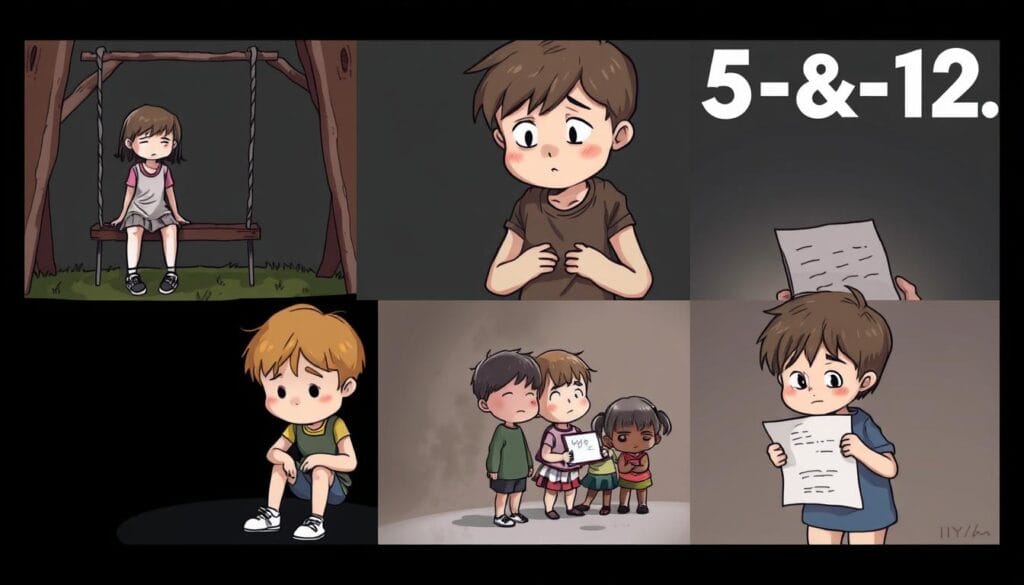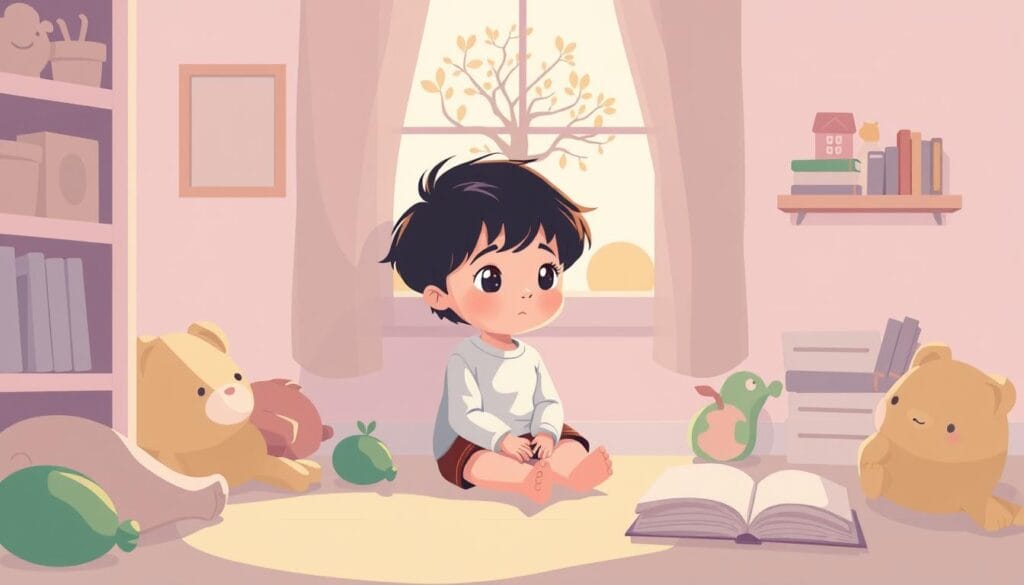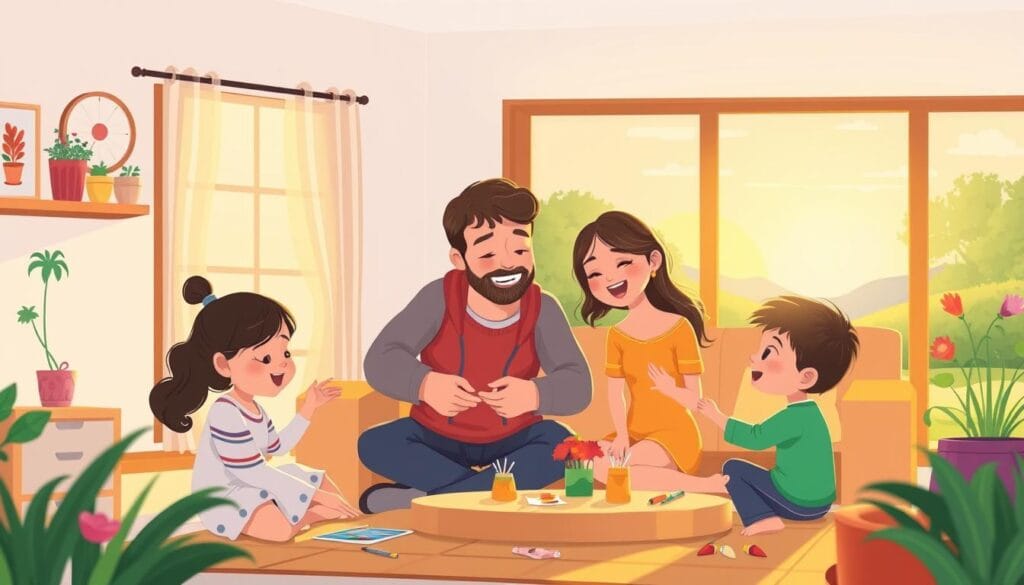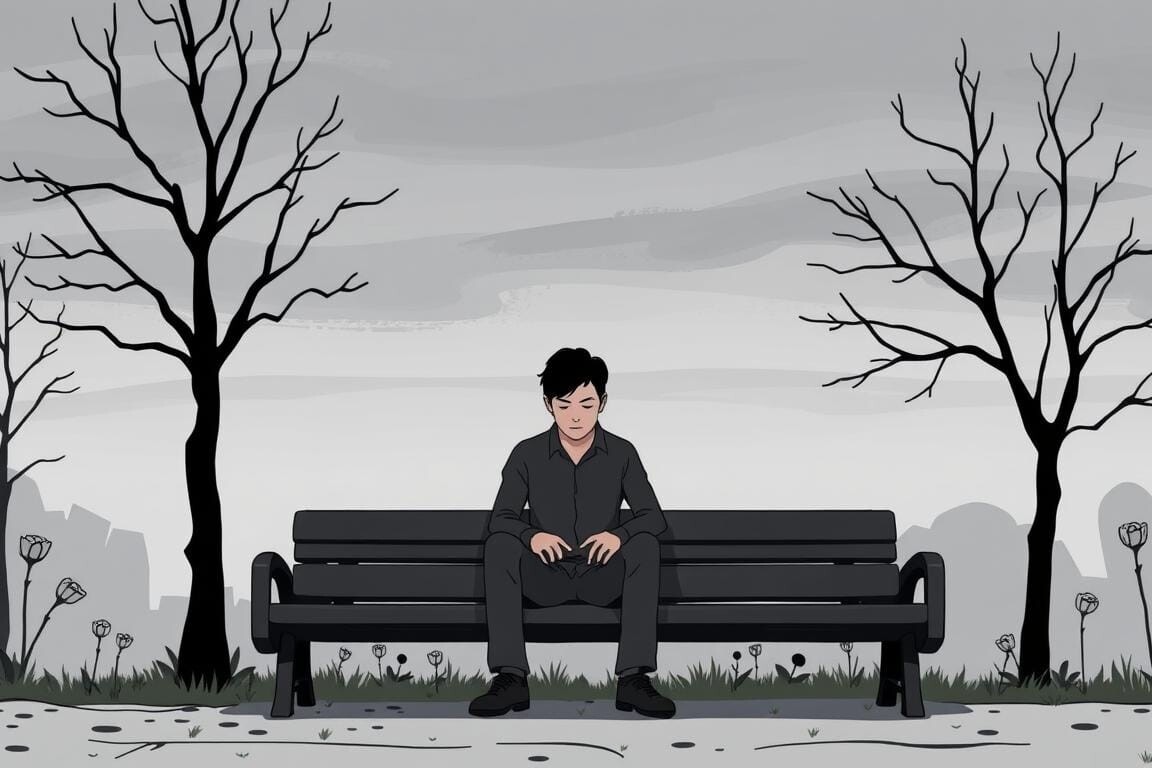Depression in children is a serious issue. It can really affect a child’s happiness and health. The Centers for Disease Control and Prevention (CDC) says about 2.7% of kids aged 3-17 have depression.
It’s very important for parents to know the signs of depression in kids. They should look for these signs and get help from experts. Dr. Chandril Chugh, a top neurologist, has written this article to help you understand depression in children. He also shares ways to support your child’s mental health.
Table of Contents
ToggleUnderstanding Depression in Children
Prevalence and Impact
Many parents don’t know how common depression is in kids. The Centers for Disease Control and Prevention (CDC) says 3.2% of kids aged 3 to 17 have depression. Depression can hurt a child’s school work, friends, and happiness.
Causes and Risk Factors
Depression in kids comes from many things. It can be because of genes, body changes, or life events. Kids with a family history of mental health issues or who have been through tough times are at higher risk. So are kids with chronic illnesses or low self-esteem.
There are different types of depression in kids. Major depressive disorder (MDD) is when depression is very bad and lasts over two weeks. Persistent depressive disorder (PDD) is when it’s milder but lasts over a year. Other types include seasonal affective disorder (SAD) and disruptive mood dysregulation disorder (DMDD).
Symptoms of depression in children
As parents, it’s key to spot the emotional, behavioral, and physical signs of depression in kids. These signs can show up in many ways and affect a child’s happiness and health.
Emotional and Behavioral Signs
Children with depression might feel sad all the time, get easily upset, and lose interest in fun activities. They might also feel they’re not worth much or guilty, and have trouble focusing. They could start sleeping or eating differently, pull away from friends, or act out more.
Physical Symptoms
Depressed kids might also have headaches, stomach problems, or feel very tired. These physical signs can make them miss school, even if they’re not sick.
Parents should watch for changes in their child’s mood, actions, and health. Spotting the emotional signs of depression in children, behavioral signs of depression in children, and physical symptoms of depression in kids helps. This way, parents can get help and support for their child.

With the right help and support, kids with depression can learn to handle their feelings and feel better again.
Recognizing the Warning Signs
It’s key to spot the signs of depression in kids early. Parents should watch for big mood and behavior shifts. Look out for ongoing sadness, anger, or mood swings. These signs might mean a child is depressed.
Changes in Mood and Behavior
Depressed kids show many emotional and behavioral signs. They might:
- Feel sad, hopeless, or empty all the time
- Get angry or moody easily
- Stop enjoying things they used to love
- Stay away from family and friends
- Have trouble sleeping or feel very tired
- Have trouble focusing or making choices
- Feel guilty, worthless, or very hard on themselves
Academic and Social Difficulties
Depression can also show up in school and social life. Parents might see their child struggling with:
- Doing poorly in school and having trouble focusing
- Not wanting to hang out with friends or join in activities
- Missing school or avoiding it
- Having trouble making and keeping friends
If you see these signs in your child, get help right away. It’s important to address depression in kids and offer the support they need.
Age-specific Manifestations
As children grow, depression symptoms change. It’s key to know how depression shows up in kids at different ages. This helps spot it early and get the right help.
Young kids, 5-10 years old, might act out more. They could have more tantrums, feel scared when apart from parents, and have trouble controlling their feelings. They might also get sick more often, like stomach aches or headaches. Their sleep and eating habits might change too.
- Behavioral changes, including increased tantrums or defiant behavior
- Separation anxiety or difficulty being away from parents
- Emotional dysregulation and mood swings
- Physical symptoms like stomach aches and headaches
- Changes in sleeping and eating patterns
Older kids and teens, 11-18 years old, might feel more emotional. They could feel worthless, guilty, or even think about suicide. They might also struggle in school, getting lower grades, or pull away from friends.
- Feelings of worthlessness, guilt, or hopelessness
- Suicidal thoughts or attempts
- Academic problems and declining grades
- Social withdrawal and isolation
Knowing how depression looks in kids of different ages helps us help them sooner. By understanding these differences, we can give each child the right care. This way, they can fight this tough mental health issue.

Depression in Children vs. Normal Sadness
As a parent, knowing the difference between normal sadness and depression in kids is key. Normal sadness is a natural part of growing up. But, if sadness lasts a long time and gets in the way of daily life, it might be depression.
Understanding the Difference
Normal sadness happens when kids face tough times, like losing a pet or fighting with friends. It usually goes away quickly and doesn’t stop kids from doing things they love. Depression, however, is a serious condition that lasts a long time. It can make kids feel really down, tired, and unhappy all the time.
When to Seek Help
If your child feels sad, angry, or just doesn’t want to do anything for weeks, it’s time to get help. Look out for these signs that your child might be depressed:
- Feeling hopeless or worthless all the time
- Changes in sleep or eating habits
- Having trouble focusing or making choices
- Not wanting to be around friends or family anymore
- Thinking about death or wanting to hurt themselves
Remember, asking for help for child depression shows you care. With the right help, kids can feel happy and full of life again.
Evaluation and Diagnosis
Dealing with childhood depression needs a full plan. This plan includes using special tools and getting help from experts. Doctors use special questionnaires to learn about a child’s feelings. These tools, like the Children’s Depression Rating Scale, help find out if a child is depressed and how bad it is.
But, getting a real diagnosis is key. Doctors like pediatricians or child psychiatrists do a deep check. They look at the child’s mental health and might do tests to find any health problems. This way, they can make a plan that really helps the child.
Screening Tools: Identifying the Signals
- The Children’s Depression Rating Scale (CDRS) is a semi-structured interview designed for children aged 6-12 to diagnose and assess the severity of depression.
- The Beck Depression Inventory (BDI) is a structured rating scale suitable for all ages, serving as both a diagnostic and severity assessment tool.
- The Mood and Feelings Questionnaire is a structured rating scale for parents and children aged 6-17, used for screening, diagnosis, and severity assessment.
- The Reynolds Adolescent Depression Scale is a structured rating scale for 11-20-year-olds to evaluate the severity of depressive symptoms.
Professional Assessment: Uncovering the Whole Picture
Getting a real diagnosis is very important. Doctors like pediatricians or child psychiatrists do a deep check. They look at the child’s mental health and might do tests to find any health problems. This way, they can make a plan that really helps the child.

It’s very important to find and treat depression in children early. By using special tools and getting help from experts, doctors can really understand what’s going on. Then, they can help the child feel better.
Treatment Options for Childhood Depression
There are many ways to treat childhood depression. Cognitive-behavioral therapy (CBT) and family therapy are good options. They help kids learn to cope and improve their relationships.
For more serious cases, doctors might suggest antidepressants. This is often for kids with moderate to severe depression.
Psychotherapy
Psychotherapy, especially CBT, is the best treatment for kids with depression. It teaches them to change negative thoughts and behaviors. DBT is also helpful for teens with severe depression.
Medication Management
For kids with more serious depression, medication might be needed. SSRIs like Zoloft and Prozac are common choices. SNRIs and atypical antidepressants are also used.
It’s crucial to watch kids closely on these medications. They should be checked for any signs of worsening symptoms or suicidal thoughts.
Every child’s treatment plan is different. It’s best to work with a mental health expert. Often, a mix of therapy and medication works best for kids with serious depression.
Coping Strategies for Parents
Parenting a child with depression is tough. But, there are ways to make it easier. Building a strong support system is key. This can include family, friends, support groups, or mental health professionals.
Having people to lean on and getting professional help can be a big help. It gives you the emotional and practical support you need. This support is crucial for your child’s mental health journey.
Building a Support System
Getting help from your community is important. Look for local or online support groups for parents of children with depression. These groups can connect you with others who understand your challenges.
Also, include your child’s teachers, counselors, and healthcare providers in your support system. They can offer valuable insights and resources.
Self-care for Caregivers
As a parent, taking care of yourself is crucial. Make time for activities that reduce stress, like exercise or meditation. Spending time with friends is also important.
Getting counseling or therapy for yourself can help too. It lets you process your emotions and find healthy ways to cope. Remember, taking care of yourself helps you support your child better.
By using these coping strategies for parents of children with depression, you can face this journey with strength and care. Your child’s well-being is very important. With the right support and strategies, you can help them overcome depression.

Prevention and Early Intervention
It’s very important to help kids stay mentally healthy and avoid depression. Teaching them how to handle tough times and building strong family bonds can help a lot. Also, dealing with issues like past traumas or ongoing health problems early on is key.
Helping kids feel good about themselves and encouraging them to be active and social is also important. Getting enough sleep is another big part of staying mentally healthy.
Studies show that starting prevention programs early can really help kids feel less anxious and depressed. But, there aren’t many programs for the youngest kids that focus on these issues. By starting early, we can give kids the tools they need to manage their mental health.
About 56% of kids and teens with anxiety and depression are getting help. This shows we need more places where kids can get help for their mental health. We need better ways to help kids before they get really sick.
By focusing on mental health, building resilience, and helping early on, we can help kids deal with life’s challenges. This sets them up for a bright future.
Here are some important ways to prevent depression in kids and help them early on:
- Teaching kids how to handle tough times and manage their feelings
- Creating a supportive home environment
- Dealing with issues like past traumas or ongoing health problems early on
- Encouraging kids to be active, social, and get enough sleep
- Starting prevention programs early, especially for the youngest kids
- Improving access to mental health services for kids and promoting early help
By focusing on these areas, we can make sure all kids have the support they need to succeed and reach their dreams.
Conclusion
It’s very important to spot and deal with depression in kids. This helps them grow up happy and healthy. Knowing the symptoms, risk factors, and treatments helps parents a lot. They can support their child’s mental health better.
Early help, working together with many experts, and having a strong support system are key. These things help kids with depression do well.
Dr. Chandril Chugh, a top neurologist, says it’s crucial to tackle childhood depression. He urges parents to get help when they need it. With the right help, kids can handle their depression and live happy lives.
Remember, dealing with childhood depression is very important. There are many resources for parents worried about their child’s mental health. By working together with doctors, you can help your child get through this and do well.
FAQ
What is the prevalence of depression in children?
The CDC says about 2.7% of kids aged 3-17 have depression.
What are the common symptoms of depression in children?
Kids with depression might feel sad or irritable a lot. They might also feel worthless or guilty. They might lose interest in things they used to like.
They could sleep or eat differently, have trouble focusing, or pull away from friends. They might also get angry or act out more.
They might also have headaches, stomachaches, or feel very tired.
How do I recognize the warning signs of depression in my child?
Look for big mood and behavior changes. Sadness, irritability, or mood swings are signs.
Also, watch for school and social problems. Kids with depression might have trouble concentrating or doing well in school. They might also have trouble making friends.
How do the symptoms of depression differ in children of different ages?
Symptoms change with age. Young kids might throw more tantrums or get really scared when separated.
Older kids and teens might feel more hopeless or even think about suicide.
How do I know if my child is experiencing clinical depression or just normal childhood sadness?
Normal sadness is short-lived and not as bad. Depression lasts a long time and really affects daily life.
If your child is sad, irritable, or loses interest for more than a few weeks, get help.
What is the process for evaluating and diagnosing depression in children?
Doctors use tests and talk to the child to figure out if they have depression. They might ask questions or use special scales.
They also do a full check-up to make sure there’s no other health problem.
What are the treatment options for children with depression?
There are many ways to help kids with depression. Therapy, like CBT, can teach them to handle feelings better.
Family therapy helps everyone in the family. Sometimes, doctors might suggest medicine, especially for more serious cases.
How can parents support their child with depression?
It’s tough to parent a child with depression. But, having support is key. Build a strong support network.
Take care of yourself too. Do things that make you happy and keep healthy.
How can I help prevent depression in my child?
Teaching kids good ways to handle feelings is important. Make your family a happy place.
Help them deal with tough times and build their self-esteem. Encourage them to exercise, make friends, and get enough sleep.
Source Links
About The Author

Medically reviewed by Dr. Chandril Chugh, MD, DM (Neurology)
Board-Certified Neurologist
Dr. Chandril Chugh is a U.S.-trained, board-certified neurologist with expertise in diagnosing and managing neurological disorders, including migraines, epilepsy, Parkinson’s disease, and movement disorders. His clinical focus includes evidence-based neurological care and patient education.
All content is reviewed for medical accuracy and aligned with current neurological guidelines.




